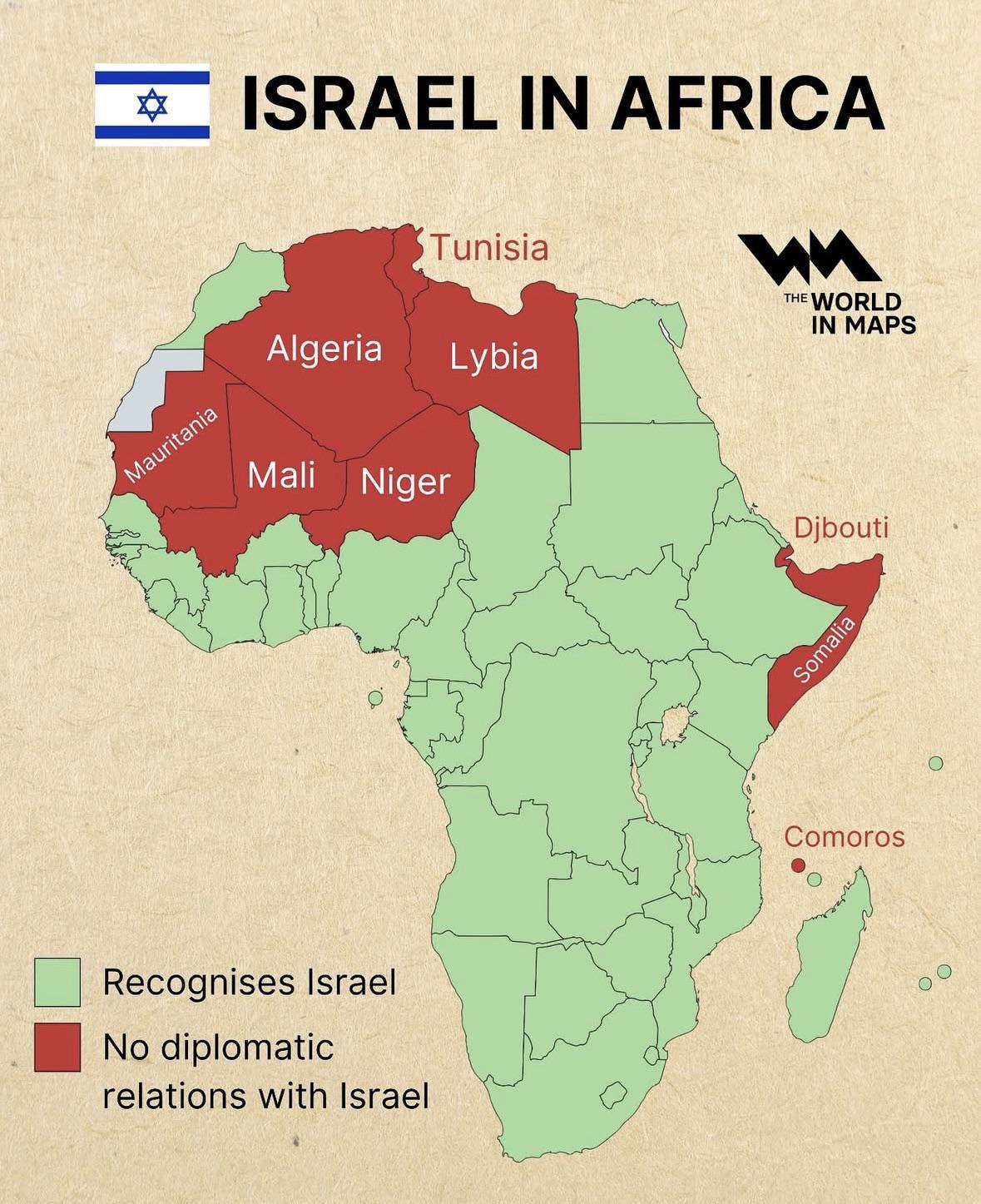Diplomatic Relations of Israel in Africa Map


David Chen
Data Visualization Specialist
David Chen is an expert in transforming complex geographic datasets into compelling visual narratives. He combines his background in computer science ...
Geographic Analysis
What This Map Shows
The "Diplomatic Relations of Israel in Africa Map" visually represents the complex web of diplomatic ties that Israel maintains across the African continent. From formal embassies to unofficial partnerships, this map highlights the diverse relationships Israel has cultivated with various African nations. You can see which countries recognize Israel, the nature of their diplomatic engagements, and how these relationships have evolved over time.
Deep Dive into Israel's Diplomatic Relations in Africa
Israel's diplomatic relations in Africa serve as a fascinating case study of international relations influenced by a myriad of factors, including historical ties, economic interests, and cultural exchanges. Since its establishment in 1948, Israel has sought to engage with African nations, recognizing the continent's strategic importance and rich resources.
Interestingly, Israel's approach to diplomacy in Africa has transformed significantly over the decades. During the 1960s and 70s, many African nations were hesitant to engage with Israel due to the Arab-Israeli conflict and pressures from their Arab neighbors. However, in recent years, a noticeable shift has occurred, with numerous African countries re-establishing or strengthening their ties with Israel. According to data from the Israeli Foreign Ministry, as of 2023, Israel maintains formal diplomatic relations with over 40 African nations.
One of the key factors driving this renewed interest is Israel's expertise in technology, agriculture, and security. For example, Israel has established agricultural projects in countries like Ethiopia and Kenya, enhancing food security and sustainability. Moreover, Israel's advanced military technology and counter-terrorism strategies are appealing to several African nations grappling with security issues, such as Nigeria and Somalia.
In addition to economic and security collaborations, cultural exchanges have played a significant role in shaping Israel's relations with African countries. Educational programs, youth exchanges, and cultural initiatives have fostered goodwill and mutual understanding. For instance, the Israeli government has sponsored scholarships for African students to study in Israel, promoting a new generation of African leaders who have firsthand experience with Israeli society.
Regional Analysis
Looking at the map, it’s clear that Israel’s relations with African nations vary significantly by region. In North Africa, countries like Egypt and Morocco have established diplomatic ties with Israel, largely due to their historical connections and peace treaties. Egypt, in particular, has been a key player in the Arab-Israeli peace process since the late 1970s.
In Sub-Saharan Africa, the situation is more diverse. East African nations, such as Uganda and Ethiopia, have maintained strong ties with Israel, often collaborating on security and agricultural initiatives. Uganda's President Yoweri Museveni has been particularly vocal about the benefits of Israel's technology and expertise for development.
In contrast, some West African nations, including Ghana and Senegal, have had a more cautious approach, balancing their relations with Israel against their solidarity with Palestinian causes. However, even these nations are beginning to explore economic partnerships with Israel, reflecting a broader trend of pragmatic diplomacy.
Southern Africa presents yet another scenario, where Israel has engaged with countries like South Africa, which historically supported Palestinian rights. Yet, recent years have seen an increase in bilateral trade and technology exchanges, indicating a complex but evolving relationship.
Significance and Impact
Understanding the diplomatic relations of Israel in Africa is crucial for grasping the intricate dynamics of international politics today. These relationships not only affect regional stability but also influence global geopolitical alignments. Israel's growing presence in Africa represents a shift towards multi-polarity in international relations, where African nations are asserting their agency and pursuing partnerships based on mutual interests rather than ideological alignments.
As the world continues to grapple with challenges such as climate change, security threats, and economic development, the partnerships formed between Israel and African nations will likely play a pivotal role. Future projections indicate that as Africa's economies grow and the demand for technology and security solutions increases, Israel's diplomatic footprint on the continent will expand further. It’s fascinating to consider how these relationships will evolve in the coming years and what that means for the broader international landscape.
In conclusion, the map of Israel's diplomatic relations in Africa is not just a collection of data points; it reflects a rich tapestry of historical ties, cultural exchanges, and strategic partnerships that will shape the future of both Israel and African nations. Have you noticed how these relationships are changing? The story is ongoing, and it’s one worth watching closely.
Visualization Details
- Published
- August 20, 2025
- Views
- 90
Comments
Loading comments...